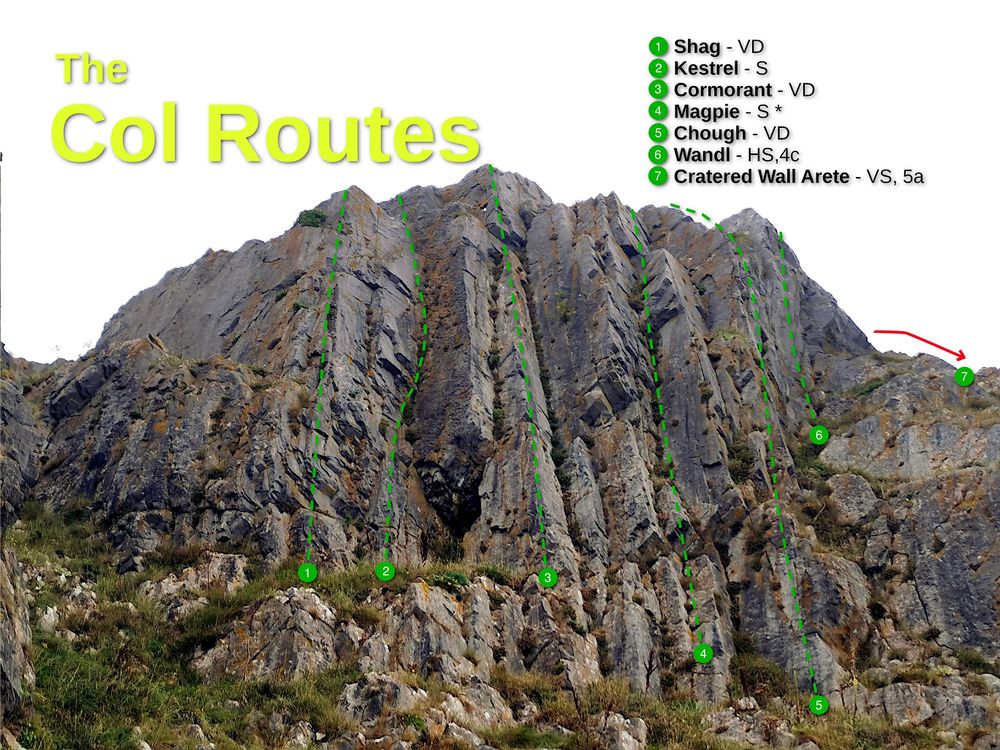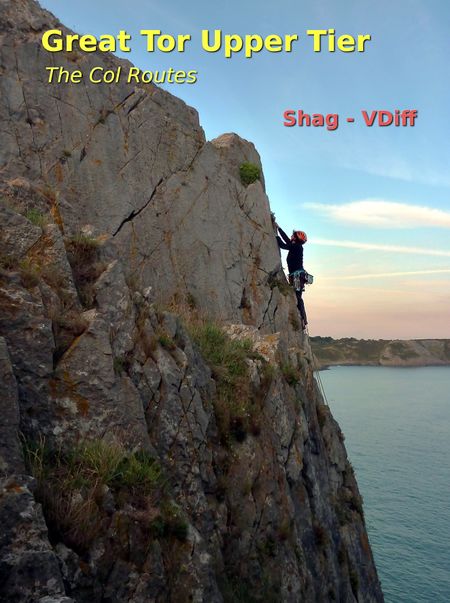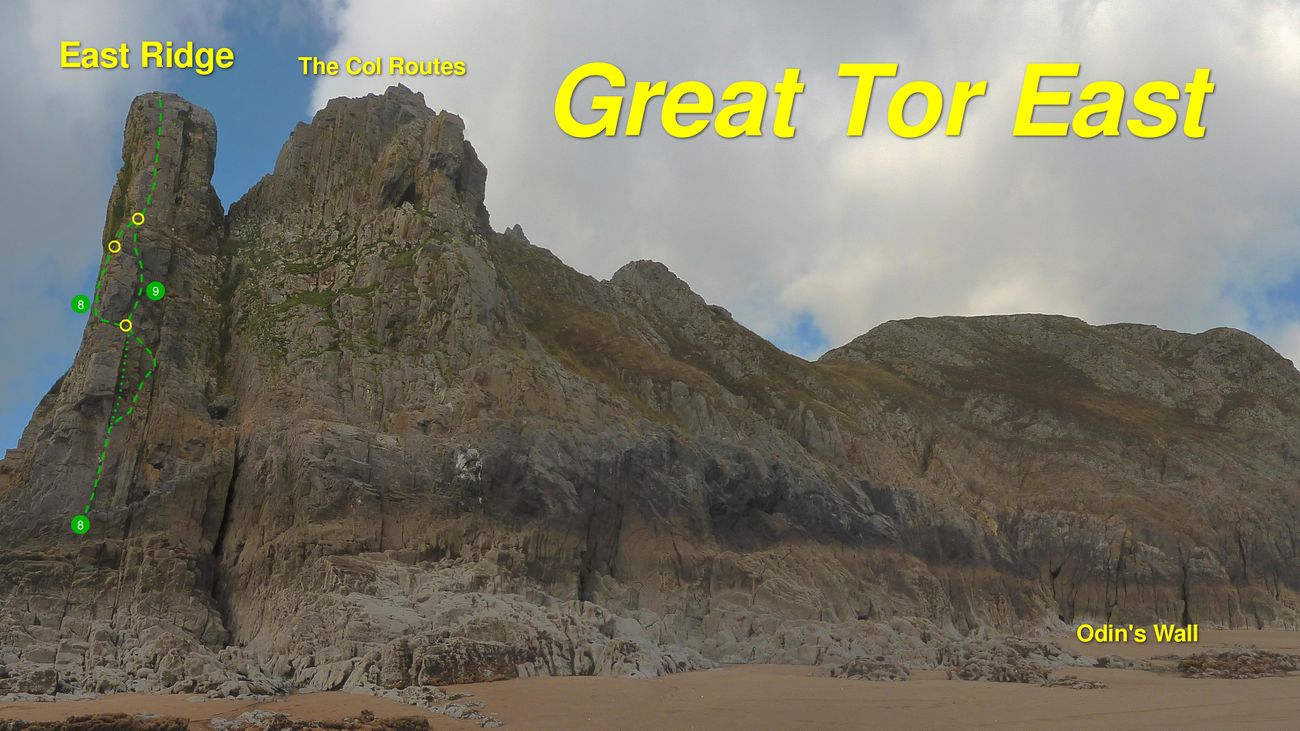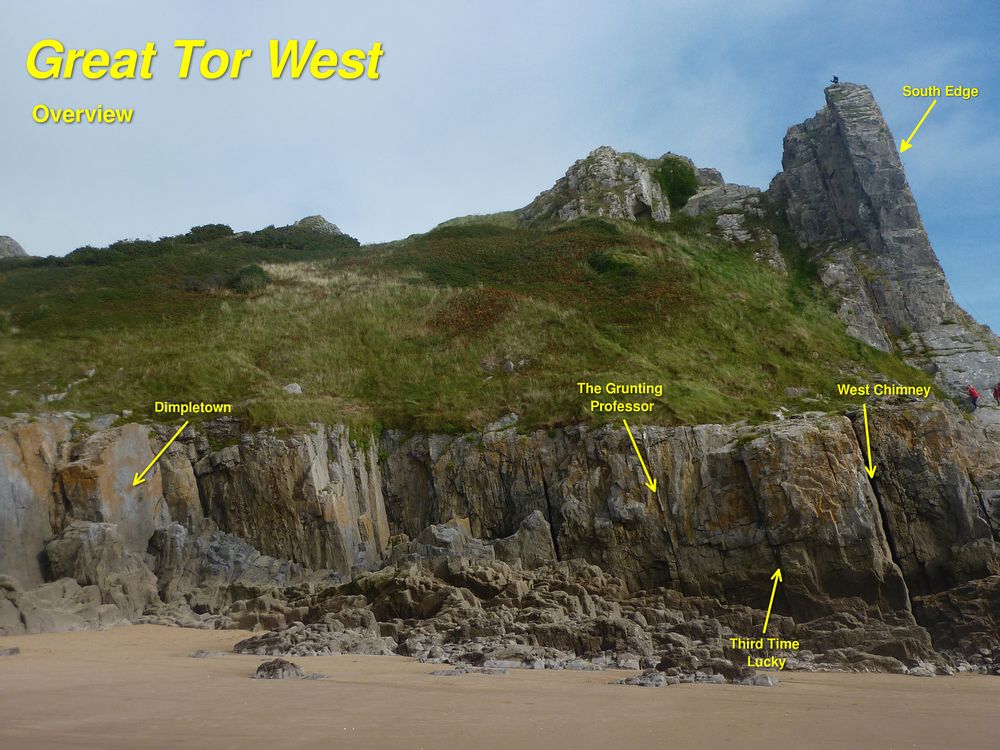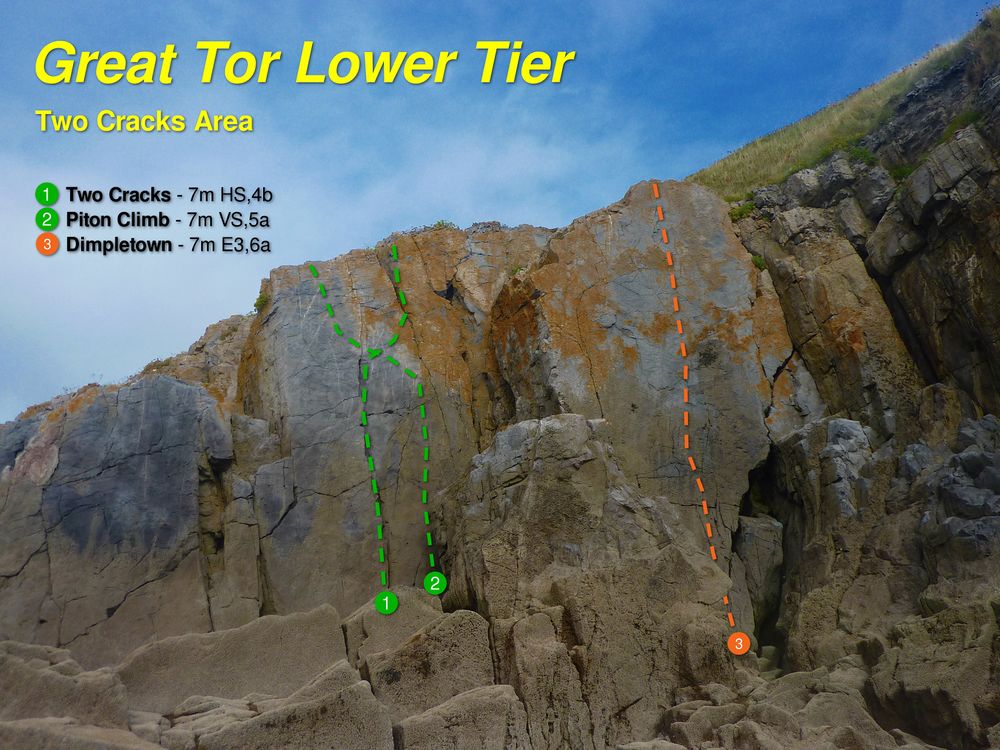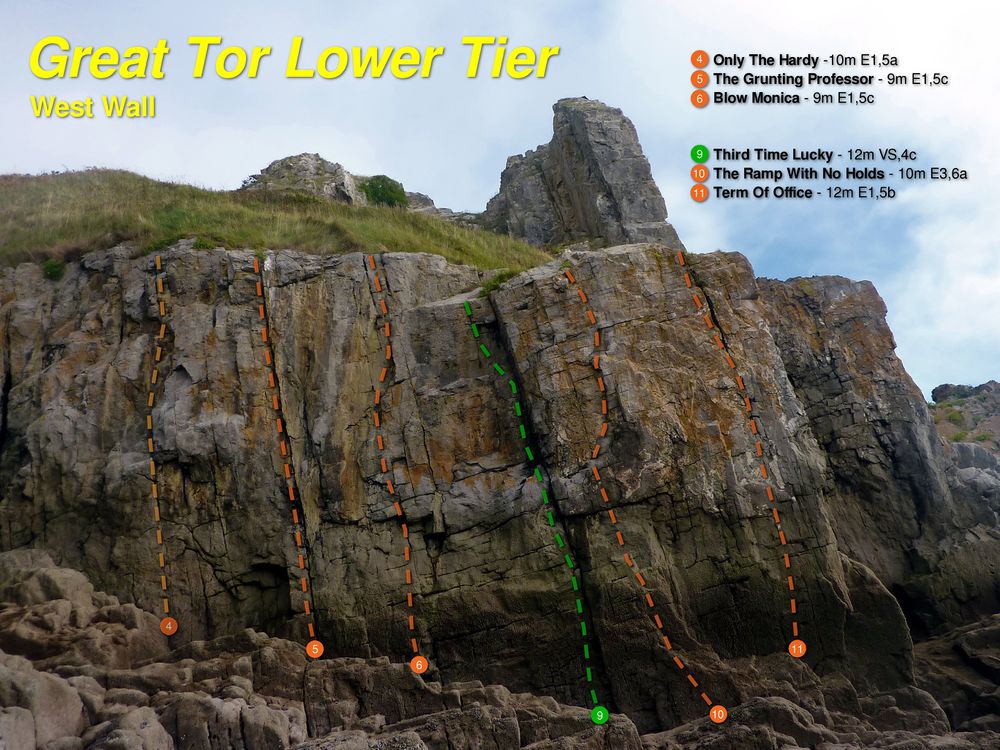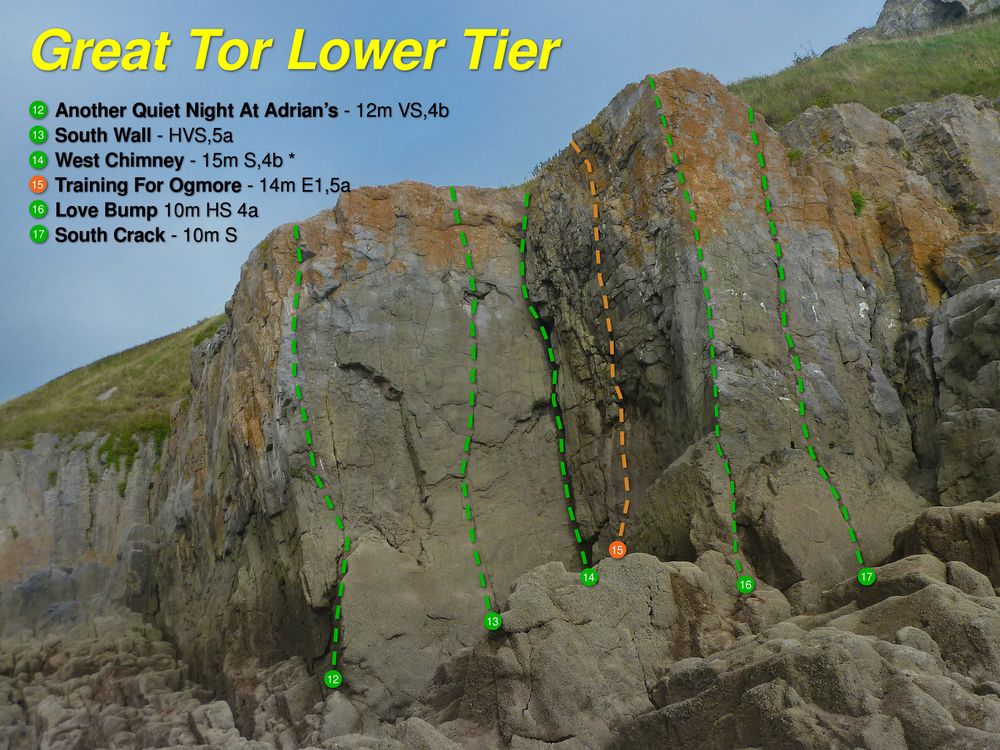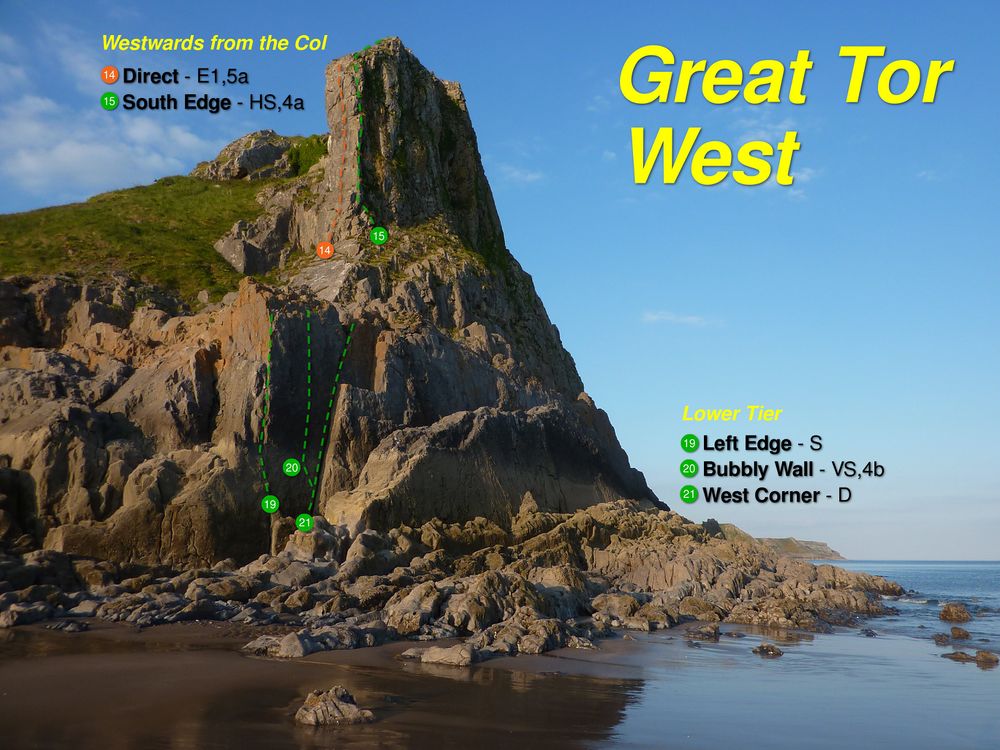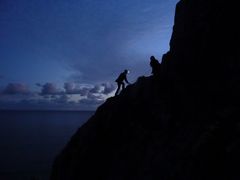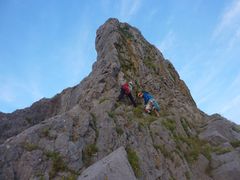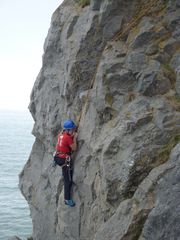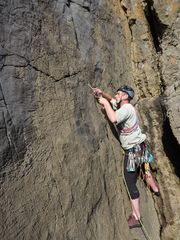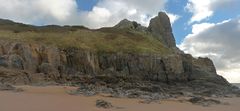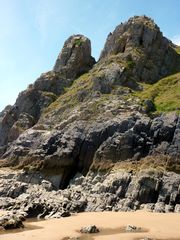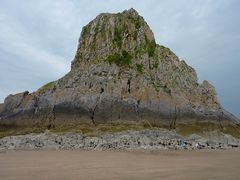Great Tor Proper
| Great Tor Proper | |
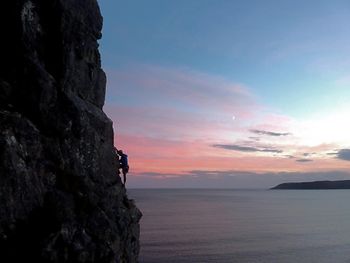 Gary Burkhardt on South Edge | |
| Rock Type | Natural Carboniferous Limestone |
|---|---|
| Climbing Style | Trad |
| Approach Time | 25 minutes |
| Area | Gower |
| Sub Area | Tor Bay and Great Tor |
| Geodata | |
| WGS-84 Location | 51.568593, -4.122941 |
| OS Grid Ref. | SS 529 876 |
| WGS-84 Parking Location | 51.575583, -4.127859 |
| GR Parking Location | SS 526 884 |
| Parking Postcode | SA3 2HJ |
| Base Elevation | 0 metres (Other) |
| General Info | |
| Faces Direction | Various |
| Aspect | Partially Sunny |
| Wind Sheltered | Seldomly |
| Climbing Type | Normal |
| Seepage | Quick drying |
| Tidal | |
| Before/After Low Tide | 1.5 hours (See Note) |
| Crags Within 400m | |
|
First Corner, Great Tor Proper, High Slab, Little Tor, Monty's Slab, Odin's Cave, Odin's Wall, Ramp Zawn, Second Corner and South Wall | |
| BMC RAD | |
| RAD Notice/Restriction | Great Tor Proper@BMC RAD |
Contents
PREAMBLE
This is the large rocky headland at the eastern end of Tor Bay. The routes on the Upper Tier and around the 'Col' have an almost mountain feel to them. At beach level there is a wide selection of climbs.
TIDAL STATUS
The upper tier is non-tidal. Climbs on the lower tier are accessible 1½ - 2 hours either side of low water.
BOLTING POLICY
No bolting.
DESCENTS
Routes on the upper tier terminate at the approach col, so refer to the notes below.
Descent from routes on the lower tier are made by following the path leading to the beach from the non-tidal platform on the west side of the tor, or by scrambling back to beach level on the east.
Great Tor is the prominent headland situated east of Little Tor. Climbs on the lower tier are best accessed from Tor Bay beach as described in the access for Little Tor.
Climbs on the Upper Tier are best accessed from the path running to the headland, which reaches the second of two cols just before Great Tor proper. The eastern (left) branch is followed to reach the Col routes and the start of East Ridge. Great Tor East is also accessible from this path. The western (right) branch leads down past the Northern Upper Tier and can be followed all the way down to the beach, consequently reaching the Lower Tier.
It is possible to scramble round the entire Tor from the base of either gully at an easy standard, at well above high tide level.
THE ROUTES
Great Tor Upper Tier
The front face of the upper tier is heavily vegetated, and there are no routes at present. The routes that do exist are clustered around the east and west flanks. Moving down the east branch of the col, to get to East Ridge, the Col routes are visible on the landward side of the gully.
South Face
This overgrown and loose face, (on which no one actually climbs and has only one recorded route),[1] has a restriction in place. See RAD notes. N.B. This restriction is unlikely to apply to one of the alternate starts to East Ridge which starts at the far eastern end of the South Face.
The Col Routes
At the top of the inland side of the east descent gully from the neck of the tor, lie a series of grooves and ribs. Although these appear vegetated, the routes are clean and are on good juggy rock.
- Shag - 15m VD
Climb the left most arête on jugs after a tricky start. - Kestrel - 15m S
The narrow wall between Shag and the cave leads to a bulge. Either skirt this on the left before returning to the corner, or climb the corner direct at the same grade. - Cormorant - 18m VD
The groove right of the cave contains an arête. Climb this with occasional help from the left edge of the groove. - Magpie - 21m S *
The groove to the right of Comorant, containing two bulges. - Chough - 21m VD
The bulbous arête and grooved arête above and to the right of Magpie. - Wandl - 12m HS,4c
Up and right a steep crack leaves a grassy bay. Climb this. - Cratered Wall Arête - 9m VS, 5a
To the right of the previous routes there is a large cave which is worth exploring. The compact steep little wall to the right of this contains interesting craters. This route takes the left arête
East Ridge Area
At the base of the east gully is a non tidal platform. Scramble round southward (out to sea and above the high tide level) to a good ledge, just before the east arête proper. Here is a prominent clean finger crack, marking the start of East Ridge.
7. Ginger Groover 18m VD
Follow the vague grooves just right of the arête and 2m left of East Ridge, via two bulges. Amble off or continue as for East Ridge.
B.Merrifield 00.00.1998
8. East Ridge 73m S,-,-,-,- ***
Excellent positions, splendid climbing and good gear, weaving around the East Ridge of the Tor. Pitches 3 and 4 are usually run together.
- 18m Climb the crack in the wall and either step right, or follow the groove above to exit at a wide ledge.
Var (i) "Avoid the crux by climbing up and around right." [2]
Var (ii) "Climb the outer seaward edge (s) to the grassy terrace; quite hard and not nearly so pleasant." [2]
Var (iii)."Superior to var (i) & (ii). Start left of the corner crack and climb up left to a small overhang below and left of an obvious block overhang. Move up and round L, then step R just above the lip of the block. Continue direct of the short wall above."[3]
Var (iv) Follow the twin cracks steeply to an easing before a wide ledge. 17m [4] - 18m From the west end of the terrace climb a groove in the seaward face of the ridge before continuing up the arête to a stance by a flake. [5]
Var (i)The crack in the centre of the back wall leads initially via polished holds to the ridge and the traditional finish of East Ridge. [4] - 13m Follow the splendidly exposed arête to a grassy stance.
Var (i) "Go right from the flake and up a slab to the crest; little to choos from either route."[2] - 24m Wander up the rest of the arête and the slabs above to belay on the summit, with superb views.
A.Osborn, S.Osborn 00.00.1952[6]
9. East Ridge Variations 73m HS,4b,4b *** [4]
Good variations on the first two pitches of the parent route. Start 2m right of East Ridge beneath twin cracks.
- 17m Follow the twin cracks steeply to an easing before a wide ledge.
- 17m The crack in the centre of the back wall leads initially via polished holds to the ridge and the traditional finish of East Ridge. [7]
Unknown Pre-1970
Westwards from the Col
Further left, the shelves lead to the ledge at the top of the Great Flake area of the Lower Tier.
There is a north-facing leaning wall about 50m down the banking.
10. Scrambled slab 12m VS 4b
Take the slab on left of Southern Freeze and Gower Kut on its left hand side. Distinct paucity of protection and gets serious. Alternatively use side runners! This pitch is surprisingly worthwhile.
C. Wyatt solo 18.05.2011
11. Gower Kut 18m E6,6b
Pain! The thin cracks in the pillar of rock, PRs.
J.Talbot, D. Thomas - North Face A1 00.00.1959, FFA G.Ashmore 31.05.1998
12. Southern Freeze 18m E1,5b
The cracks right of Gower Kut starting from a grassy scoop. Good to start, but deteriorates after the ledge.
J.Harwood, A.Sharp 24.01.1980
13. Mistral 25m E4,6a **
Amenable for the grade. Start as for Southern Freeze. Balance up the groove in the arête and reach a sloping ledge at 4m. Step right onto the arête PR and climb it with technical moves, PR, to bigger holds slightly right. Pull onto the capping slab and walk off onto the summit.
M.Crocker, J.Harwood 21.03.1999
The next route starts at a much lower level, at the base of a slab.
14. North Corner 39m HVS,5a
The stepped corner. Climb the quartz-flecked slab until it is possible to move left to the foot of the corner. Finish up the final slab. The route is vegetated and the grade may no longer be accurate.
R.Owen, C.Andrews 00.00.1959
The next two routes are on the narrow west facing edge of the Tor, seaward from North Corner and facing back
towards Little Tor.
14. Direct 42m E1,5a
Start below the narrow west face at an easy-angled calcite-flecked slab some way up the beach. Follow a direct line up the centre of the west face with poor protection.
R.Owen, C.Andrews 00.00.1959
15. South Edge 42m HS,4a
Start as for Direct. Climb the right edge of the slab to its top. The rock needs care in the upper reaches.
J.Talbot, D.Thomas 00.00.1959
Great Tor Lower Tier
There are a number of good routes at this less popular area of Great Tor.
Routes on the lower tier are described from west to east (left to right facing inland), as approached from Tor Beach.
The first area of rock encountered is a small twin slab lying midway along the west side of the headland. The left twin is lower, the right twin contains a deep crack running to three-quarters height.
There is a 4m boulder problem up the left-hand slab (Bulge, 4b, C.Andrews 1959).
1. Two Cracks 7m HS,4b
Follow the crack stepping right into a second where it ends.
J.Talbot, D.Thomas 00.00.1959
2. Piton Climb 7m VS,5a
Climb the wall just right of Two Cracks. Step left into the crack at its top and move up and left to finish.
J.Talbot, D.Thomas 00.00.1959
A little to the right of Piton Climb is a sheer south-facing slab.
3. Dimpletown 10m E3,6a *
A little gem. From the lowest part of the slab climb direct on small holds. A Bristol blade PR at half-height protects.
M.Crocker, J.Harwood 23.03.1999
The wall now turns to face west. The prominent features of the wall are a left-slanting crack with a narrow black
corner 5m to the right and a sharp arête 5m right again. Beyond this is an obvious chimney (West Chimney). N.B. There are now good belay stakes at the top of the area between Only the Hardy and Term of Office[8]
4. Only The Hardy 10m E1,5a
Climb the wall and shallow groove 2m left of a prominent left-slanting crack.
M.Crocker, J.Harwood 23.03.1999
5. The Grunting Professor 9m E1,5c
The left-slanting crack.
M.Crocker, J.Harwood 23.03.1999
6. Blow Monica 9m E1,5c
Start 2m left of the crack leading into the narrow black corner. Work up to a brown flake groove and take pockets to the top.
M.Crocker, J.Harwood 23.03.1999
7. The Cramps In The Cold 10m E2,5c
Good climbing. Follow good, widely spaced holds 2m left of the arête of the black corner, finishing immediately left of a wide crystalline crack.
M.Crocker, J.Harwood 23.03.1999
8. Mighty Mouse 10m HVS,5b
Start to the right, about 2m left of the black corner of Third Time Lucky. Climb the wall direct via a thin crack and shallow groove to the top.
J.Harwood, M.Ismail 01.05.1999
9. Third Time Lucky 12m VS,4c
Climb the narrow black corner.
T.Hulff, L.Ashton 00.00.1999
10. The Ramp With No Holds 10m E3,6a
Gain and climb the shallow ramp right of the narrow black corner to a jug. Finish direct past the stuck on jug.
M.Crocker, J.Harwood 23.03.1999
11. Term Of Office 12m E1,5b
Climb the crack on the left side of the arête to the right.
T.Hulff, L.Ashton 00.00.1999
Moving seaward from the cracked slab is a series of steep low walls, terminating in an obvious arête, beyond which lies an obvious chimney.
12. Another Quiet Night At Adrian's 12m VS,4b
Reach the arête from a ledge on its right and climb it.
L.Ashton, J.Robinson 00.00.1999
13. South Wall HVS,5a
The thin crack in the wall between Another Quiet Night At Adrian's and West Chimney.
J.Talbot, D.Thomas 00.00.1959
14. West Chimney 15m S,4b *
The obvious chimney is highly intriguing.
D.Jones, R.Owen 1954/55
15. Training For Ogmore 14m HVS,5a
The centre of the wall to the right of West Chimney. Cleaned up winter 2018
J.Brown, E.Mair-Thomas 00.00.1996''
16. Love Bump 10m HS 4a
The arête between Training for Ogmore and South Crack.
Nick Taylor, o/s solo 26.5.09
17. South Crack 10m S
The seaward-facing slab just right of Training For Ogmore is climbed by a crack and delicate finish.
J.Talbot, D.Thomas 00.00.1959
The lower tier now turns to face south at the line of Left Edge.
18. Broken Wall12m D
Takes the centre of the narrow stepped wall left of Left Edge.
J.Talbot 00.00.1959
19. Left Edge 18m S
This follows the left edge of the bubbly wall. Start at the left end of a small ledge, climb the crack to a shallow groove in the arête. Finish up the crack above.
J.Talbot 00.00.1960
20. Bubbly Wall 18m VS,4b *
Start as for West Corner but step left onto the wall and follow a thin crack to the top.
J.Talbot, D.Thomas 00.00.1960
21. West Corner 12m D
Climbs the corner behind the left edge of the Great Flake (the area of rock shielding this wall from the sea).
A.Osborn, S.Osborn 00.00.1952
22. Barnacle 13m VS,4c
Start 3m right of West Corner below a distinct hole in the rock. Climb past the hole and continue to a good ledge. Finish up the yellow wall above.
J.Talbot 00.00.1960
23. Preuss Crack 13m HS,4b *
Start at a distinct short crack in the lower wall, 3m right of Barnacle. From the end of the crack, bear left, climbing a conglomerate crack above to finish.
J.Talbot 00.00.1960
24. Curving Corner 13m VS,4c
A bold route that climbs a crack beneath the left end of an obvious ledge. Follow the thin crack above the left end of the ledge.
J.Talbot 00.00.1960
25. Direct II 18m HVS,4c
From the ledge of Curving Corner, climb the thin wall directly. Bold.
J.Talbot 00.00.1960
26. Right Curving Corner 21m S,4c
As for Curving Corner to the ledge, traverse right to below a corner and follow it to the top.
J.Talbot 00.00.1960
27. Brown Slab 21m VD
This takes the wall right of the corner of Right Curving Corner on big holds, after a difficult start.
J.Talbot 00.00.1960
28. Holey Wall 24m VD
Gain and climb the short crack right of Brown Slab.
J.Talbot 00.00.1960
Next is a slightly recessed wall containing a crack on its right (Right Corner).
29. Left Corner 15m VD
Start as for Right Corner but exit the crack immediately, moving left and up to finish.
J.Talbot, D.Thomas 00.00.1958
30. Direct I 15m HS,4b
The slab between the Corner Routes.
J.Talbot 00.00.1959
31. Right Corner 15m D
Climb the crack following it rightwards to the top via a corner.
J.Talbot, D.Thomas 00.00.1959
32. Block Wall 16m VD
Begin as for Right Corner, then traverse right above the pool to finish direct on good holds.
J.Talbot 00.00.1959
33. Central Crack I 16m D *
Start at the right side of the pool and climb a crack to the top.
J.Talbot, D.Thomas 00.00.1959
34. Right Crack I 16m VD
Start at the smaller block, then climb a wide crack, which narrows to the top.
J.Talbot 00.00.1959
35. Right Side 6m D
Start at the top of the largest block, to climb delicately and directly to the top.
J.Talbot 00.00.1959
The last climbing in the south frontal section, to the right (east) of the other climbs is on a recessed yellow face,
crossed by two right to left rising ramps.
36. Left Pillar 10m HS
Climb the left pillar directly, passing the ramp en route.
J.Talbot, D.Thomas 00.00.1959
37. Central Crack II 12m S
The crack above the centre of the lower ramp.
J.Talbot, D.Thomas 00.00.1959
38. Right Pillar 12m HVS,5a
The steep slab right again, bold.
Traditional 00.00.0000
To the right lie two cracks, both start from the right end of the lower ramp.
39. Left Crack I 10m VD
The thinner left-hand crack.
J.Talbot, D.Thomas 00.00.1959
40. Right Crack II 10m D
The ledgey corner and wider right-hand crack.
J.Talbot, D.Thomas 00.00.1959
41. Cracked Up 10m VD
Climb the first weakness in the upper ramp. Step left to a crack, then climb the curving crack above the ledge.
Unknown Pre-1998
42. Cracked It 8m D
From the first weakness of Cracked Up, take the wider crack passing ledges en route.
Unknown Pre-1998
43. Central Route 8m S
A disjointed crack, often filled with barnacles, splits the centre of the wall right again.
J.Talbot 00.00.1960
44. Left Crack II 6m D
The left slanting cracks just before the end of the seaward face.
J.Talbot, D.Thomas 00.00.1959
Notes
Additional Photos
First Ascents
The Col Routes
- Shag - D.Irving, C.Shorrock 00.00.1999
- Kestrel - J.Talbot 00.00.1971
- Cormorant - J.Talbot 00.00.1971
- Magpie - J.Talbot 00.00.1971
- Chough - D.Irving 00.00.1999
- Wandl - J.Talbot 00.00.1971
- Cratered Wall Arête - C. Wyatt 19.05.11
Notes
- ↑ "An impressive rock face, unfortunately far too vegetated to offer good climbs. To date, this facet has only yielded one route, following a marked recess of the W pillar. Climbed by H. Insley; nobody deemed to follow him, and it has seldom been climbed since." in Talbot, 1970. p.78
- ↑ 2.0 2.1 2.2 Talbot, 1970 p. 60.
- ↑ Gower Peninsula Supplement (1973), p. 10.
- ↑ 4.0 4.1 4.2 Gower & S.E. Wales (2003), p.152
- ↑ This is first described in Talbot, 1970, p. 60, as "pointless". This variation is first identified as a non-variant in Gower and South East Wales (1983), p. 58. Talbot (1970) uses var (i) below as the pitch 'proper'.
- ↑ "...East Ridge on Great Tor, traditionally described as being climbed by Vaughan-Thomas in the 1930s, although there is a counter claim from an unknown mountaineer putting the first ascent date at 1937 and Jeremy Talbot now believed that it was probably climbed in the twenties." See, Ashmore, G. & Thomas, R. "Gower and S. E. Wales." South Wales Mountaineering Club (2003): p.21
- ↑ To those grizzling of undergrading and polish on this variation, consider what J. O. Talbot says in Gower Peninsula (1970), p. 60. "Climb the distinct central crack which sinks into a corner higher up, R of some overhanging rock (crux, V-), and exit to a square ledge, highly polished rock and awkward."
- ↑ Placed on a "mini-expedition" on 10 Nov 2020 by Matt W., Roy T, and Tim H.
